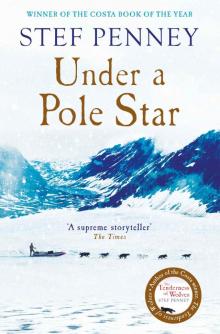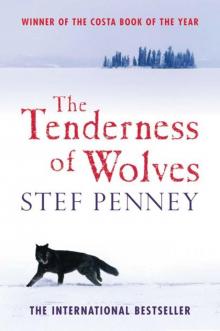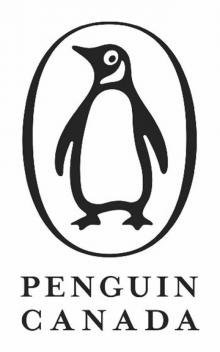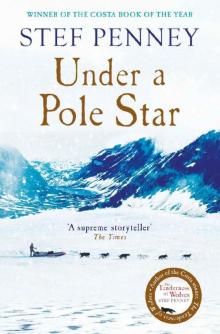- Home
- Stef Penney
Under a Pole Star Page 4
Under a Pole Star Read online
Page 4
He stared at the wall above her head.
‘No!’ said Flora, revolted to the depths of her being. Moira had warned her that this disgusting thing lay in wait for her, but she had chosen to forget it.
‘It could be that it is about to begin – that would cause stomach pains.’
‘Oh.’ She wished he would go away.
‘Or . . . it is just possible that it might be appendicitis. I need to make sure. If you would lift your jacket . . .’
‘It doesn’t hurt now.’
‘I will be able to feel if the appendix is inflamed. It could be dangerous.’
Flora found herself lying back, lifting her jacket and tugging the various layers out of her waistband.
‘I’m sorry if my hand is cold,’ he said, and put his hand – damp, clammy – on her stomach and pressed down. She tried not to recoil.
‘Does that hurt?’
She shook her head. He moved his fingers around, pressing her flesh. She felt that she was being punished. He was looking at her face, more or less.
‘And here? Does that hurt?’
Flora nodded. ‘A bit. It’s much better than it was.’
‘Let me just . . .’
He pushed his hand further down towards the space between her legs, pressing and probing. His breathing changed. His fingers were now on the bony mound between her legs, and her heart quickened. She felt strange.
Without looking, Honey said gently, ‘How is that?’ His fingers probed further.
Suddenly, roughly, Flora pushed him away, wriggling herself upright in the same movement. Her hand went, without conscious intent, to the knife hanging round her neck; she pulled it out and held it in front of her face.
Honey jerked back, eyes wide. Flora realised that the blade was still folded into the handle, and cursed herself. But her face was murderous enough.
After a second, he attempted a laugh.
‘This is perfectly normal, Flora! This is what doctors do. We have to examine our patients if we are to find out what ails them. Down there is where the appendix is located. Did I hurt you?’
She looked down. He tried to laugh again, but didn’t, quite.
‘Well, it doesn’t seem to be the appendix. Put that . . . weapon away, like a good girl. I am sure it was something you ate, and no wonder. Perhaps you should avoid the pemmican for a few days; it really is vile stuff. Although seal meat is no better.’
Flora covered herself and pulled up her knees as a barrier between them. Her heart was hammering and her face was hot. Honey’s face was flushed too, though whether with shame or anger, she had no idea.
‘You understand, Flora? I was carrying out a perfectly normal examination. Heavens, you’re a child! You cannot think . . .’
He drew back, shaking his head at the very idea.
‘Flora, say that you understand what I’m saying.’
‘I understand,’ she mumbled.
‘We’re friends, are we not?’
She nodded, ashamed of herself. What was wrong with her that she reacted in this silly way to poor, harmless Dr Honey?
‘Well then . . . No harm done?’
She nodded, and muttered, ‘I’m sorry.’
Honey laughed, relieved. ‘At least the blade was sheathed!’
Flora laughed too, hating herself.
‘So – ha, ha – when you speak to your father, you won’t tell him . . . ?’
If he hadn’t said that, Flora would ever afterwards have believed she was in the wrong. But again that knell of alarm struck her, and she knew that he was begging, that he felt ashamed.
‘No, of course not,’ she said.
Her face was a stone. She was ashamed too; it was her fault, clearly. She was bad, to make him do that. Could he tell that she had liked it?
.
Late that night, a storm blew up. Flora brooded in her bunk. No one had previously made her feel her femininity as such a burden and a curse. She felt betrayed, but the person she was most angry with was herself. She must have behaved with Honey in such a way as to invite what he did. And the boys . . . She unfolded her knife and pressed the tip against the skin of her inner arm. A bead of blood appeared, fascinating and frightening her.
Winds battered them from the north; the temperature dropped until the ice cracked like pistols and rang like bells. The wind howled up and down the scale; the frozen rigging clattered; ice fell to the deck with a musical clinking and susurrating; the timbers creaked; the ice growled, and groaned, and screeched. The sailors were kept busy hammering ice off the timbers and rigging, but just as quickly it built up again; every morning the ship was encrusted; it threatened to engulf them. The rest of the time they joked and sang, and, sometimes, prayed. It did not occur to Flora to be afraid. She was with her father, the great Captain Mackie, in the Vega, the finest ship out of Dundee, or anywhere. When the storm blew itself out and the moon shone for the first time in days, everything was softened and blurred with snowdrift. It was peaceful, but the Symmetry had gone.
Flora had to wait several hours before the search parties returned. Not a single member of the Symmetry’s crew had been lost. The slowness of the ship’s destruction meant they had been able to abandon ship and take most of their belongings with them. The crew was split among the remaining ships; eight came to the Vega.
It lightened the atmosphere to have fresh blood. Petty quarrels were forgotten. Dr Honey was kept busy with frostbites and crush injuries. Flora spent more time with Robert Avas, or reading. Captain Mackie made a visit to the Eskimo village and stayed away for two nights. When he came back, he told Flora he had something funny to tell her, but she could see he felt awkward. He said they had been asking for her – or rather, asking after Mackie’s ‘erneq’, which he’d thought was the word for ‘child’, in the way that ‘qatannguh’ was the word for both ‘brother’ and ‘sister’. But it turned out that ‘erneq’ meant only ‘son’, and so everyone thought – ha, ha! – Flora was a boy! There had been much laughter when he explained she was a girl, especially from Tateraq and Aniguin.
‘I’m sorry, Flora. Not that you look like a boy, not at all . . . but it’s difficult for them. They’ve never seen a white female before. And they said you were so good at spear-throwing – quite as good as any boy! Don’t be so down in the mouth. When you think how many clothes we all wear – why, all they’ve ever seen of you is a bit of your face.’
Flora was confused. She supposed it made the incident with Tateraq and Aniguin less alarming, but she didn’t know whether to be insulted that they had thought she was a boy, or flattered.
For the whalers, too, it was easy to get hold of the wrong end of the stick. Relationships were particularly confusing. Flora came to understand that there were only perhaps two hundred people in the area of Smith Sound. Everyone was related, or knew each other well. The population of north-west Greenland was roughly the same as that of an average Scottish street. And with their elastic comprehension of family ties – swapped wives, adopted children, half-brothers and sisters – there was a dense web of interconnectedness. It was no wonder her friends rarely said ‘I’ do this or that, but always ‘we’ do this, or ‘the Inuit’ do that.
Flora picked up the language quickly. She learnt that Aniguin was adopted, his parents both dead. He told Flora he would have died if Apilah and Simiak hadn’t taken him in. He became her closest friend.
‘You’re unhappy to go away from us,’ he said, when the ice started to break up in spring. ‘You must not be. You will come back. The spirits told me this.’
Aniguin claimed to hear voices, and to commune with unseen beings. She thought it was something he affected to make himself more important. She understood why he would do this.
‘We’re friends, Fellora.’
‘Best friends, Aniguin. I will come back, I promise.’
‘Tate
raq says he is going to marry you, but you won’t, will you?’ He looked anxiously at her.
‘No, I won’t marry him. Never!’ Flora laughed, aghast at the thought.
‘He has everything and I have nothing. It’s always like this. Look, you see those two . . . ?’
Between his outspread fingers, Flora saw two stars, side by side – the ones he called the Doorway, and she, Gemini.
‘They are we.’
She was enchanted. The thought of being a star made her dizzy.
‘You will come back, Fellora, and then we will marry. I am going to be a great angekok!’
He grasped a handful of sky as he said this, as if to demonstrate his power, but he laughed, and Flora laughed too.
A week after they turned for home, the Vega’s hold stuffed with oil and bone, there was a rent in the fog to the west, and they saw a ship. It was not one of the Scottish fleet. Captain Mackie stared through his glass until tears ran down his face. It was American, he said.
‘A whaler?’
‘It doesn’t look like one.’
There was something in his voice that was unusual.
‘What is it? Why do you make that face?’
Flora had seen much this last year; perhaps he had forgotten about protecting her sensibilities. She had survived the north, had thrived; she had made friends and laughed – something he did not remember seeing at home. So he told her what he thought: there was a party of American soldiers who had been sent to live far to the north, on Ellesmere Land, the land divided from Greenland by the Davis Strait, and which Flora had occasionally seen on clear days. The men had been gone over two years, and had not been heard of since. The ship was probably a relief ship, going to succour them . . . if it was not too late.
‘What are they doing there?’ asked Flora, who had not heard of men going to such remote regions for any reason other than oil, bone and money. She could not see the point of sending soldiers somewhere where there was no one to fight.
‘I think they are scientists. They measure the weather and look at the rocks. Or perhaps they are trying to go to the North Pole. Or perhaps both.’
‘What’s at the North Pole?’
‘No one knows. That’s why someone has to go there, to find out. The last men who tried were with the British navy. They set off over the sea-ice in sleds, but they had to come back before they had gone far.’
‘Why?’
‘They became ill with scurvy.’
‘Didn’t they have lime juice?’
‘I don’t know. I suppose not.’
‘That was silly of them.’
Flora studied the ghostly ship through narrowed eyes. Fog swirled around it.
‘I will go to the North Pole, when I am older.’
Captain Mackie looked at her with a tinge of unease. Mostly – because he was unfamiliar with young girls and how they behaved – he did not worry overmuch about the masculine atmosphere of the ship and the effect it might have on her. He knew the Vega to be God-fearing and sober, and that every sailor on her respected him. But occasionally Flora would come out with something that struck him as a ridiculous thing for a female to say.
Flora glared. ‘You don’t believe me. But you’ll see.’
‘Perhaps the Americans have already gone there. And now they know all its secrets. One thing I can tell you – there are no whales there.’
‘Perhaps the Americans got scurvy too. If they’ve been gone for two years, mightn’t they be dead?’
Privately, he thought it likely, but did not want to frighten her. ‘Oh, I’m sure they are alive.’
‘They might have eaten polar bears.’
‘Yes, indeed. Or seals. That is how the huskies live, after all – by eating seals.’
Flora and her father peered at the shadowy vessel, its outlines blurring and fading, until it was eaten up by the fog.
.
Captain Mackie’s fears were well founded. It was the ship that would later bring back the survivors of the Lady Franklin Bay Expedition: six starving men out of an original party of twenty-five. They had not been to the North Pole, and they made a mistake: they had not eaten polar bears or seals, like the huskies; instead, they had eaten each other.
Chapter 3
New York, 40˚42’N, 74˚00’W
1871–80
ADRIFT ON AN ICE FLOE. No more thrilling or improbable adventure could be invented than the actual experiences of Captain Tyson, half the crew of the Polaris, and the two Eskimo families in their employ, who took to the ice when the ship was crushed. They were part of the expedition led by Captain Charles Francis Hall, who lost his life before they had proceeded far on their way. In the gales that followed the ship’s sinking, they lost their boats and had to exist on a rapidly diminishing ice floe as it was slowly carried south by swirling currents and icy gales. Time after time they tried to get to land, but were thwarted by the weather. For six long months the party of nineteen lived off scraps of food and the occasional seal, shot by their native friends, before the ice floe was at last seen by a sealer off Newfoundland. Captain Tyson, on their rescue, said it was a miracle – and one that had come not a moment too soon. Incredibly, not a single life – not even those of the Eskimo children – was lost.
New York Examiner, 12th October, 1874
Jakob de Beyn’s fascination with ice stemmed from childhood. At the age of ten, he read news reports of the disastrous Polaris expedition with an excitement that seized him by the throat. The stories were wilder and more incredible than any fiction; they had the starkness of truth, and the thrill of proximity: the wharves from which these men had set sail were almost within sight. He began reading accounts of previous Arctic explorers: from Kane, Hayes and the ultimately unfortunate Hall, he progressed back in time to McClintock, Parry, Scoresby. Not every explorer got into a pickle. The British record had been, for a long time, quite respectable, although it came crashing down with the Franklin disaster. The climate and conditions were challenging, but, even as a boy, he suspected that Franklin, Tyson et al. had been wrongheaded and incompetent. He couldn’t help feeling that he could do better. How an orphan growing up in genteel poverty on the Lower East Side would ever be in a position to do so was not, at this stage, clear.
.
Jakob never knew his mother. She had died in an epidemic which swept the country in the wake of the War of the Rebellion, when his brother Hendrik was eight, and Jakob too young to remember. His father was an uncertain memory. Arent de Beyn was a minor civil engineer who had perished working on the foundations of the New York and Brooklyn Bridge. Working in caissons on the bed of the East River led to several cases of nitrogen poisoning; many of the construction crew suffered, including the chief engineer, who was paralysed by the disease. (It was an unlucky bridge; its designer had been injured while surveying the site, and subsequently died of tetanus.) Less famously, Arent de Beyn was – the story went – crippled with pain on leaving the caisson one dark February evening and fell into the East River. He shouldn’t have drowned, but it was dark and chaotic and hours passed before anyone realised he was missing. His sons did not attend the funeral.
Some time after that – after a period of being shuttled from one set of relatives to another – the boys settled with their father’s cousin, a stern Lutheran they called Uncle Seppe, and his wife Grietje. The Koppels, who had two adult daughters living upstate, were doing their duty to Arent and to God, as they saw it, but were unprepared for the demands of two young boys. They went to church for three hours every Sunday, and said grace before every meal. Uncle Seppe was a great believer in stiffening the sinews, in making the mind master of the flesh. There was a slight suggestion emanating from him and his wife that he had failed in this duty in regard to his own daughters and was not going to make the same mistake again.
Jakob hated living there. They both did, but Hendrik had
already developed reserves of stoicism and self-control that would always elude his younger brother. The elder by six years, he felt responsible for Jakob. Hendrik protected him, in part because he reminded Hendrik so much of their mother. The boys had one likeness of Annette de Beyn – a tintype photograph mounted on a card. Where Hendrik was fair and blue-eyed, Jakob had the dark eyes and grave expression of the woman in the picture. He seemed, to his brother, small, fey, delicate. Their mother had been the same – she had needed protection from the typhoid miasma, but his father and he had unaccountably, unforgivably, failed to provide it.
.
The first winter the boys lived with the Koppels was a harsh one. Snow gathered in drifts up the sides of houses, telegraph wires came down under the weight of ice. People, somewhere, it was rumoured, froze to death in the street.
A main prop of Uncle Seppe’s regime was that the boys had to wash in cold water every morning, as he did himself. Even in winter, they got their washing water from a barrel in the backyard, smashing the ice on the surface with the hatchet that hung on a rope. One day, Hendrik pointed out that they could fetch the water indoors the night before, where it wouldn’t freeze. Uncle Seppe told him he could wash out in the yard from then on. Hendrik did so without complaint for a week, until the temperature dropped so low that the water in the barrel froze solid. One morning, he was still out in the yard when they started breakfast, eating in silence, listening to the peck of the axe on ice. He was chopping an awful lot of ice, Jakob thought; perhaps he wanted a bath. Without a word, Hendrik brought the pail of ice inside and poured the contents on to the breakfast table in front of his uncle, right under his nose. Jakob, who knew something was up as soon as he saw his brother’s face, felt a thrill of horror. He stopped chewing and held his breath. Mrs Koppel, a sandy, nervous woman, gasped and leapt to her feet.
‘What are you doing, wicked boy! Clean that up right away!’
‘You try washing in that,’ Hendrik said evenly. He was twelve.
Mrs Koppel looked at her husband. Uncle Seppe continued to eat bread and cheese, refusing to meet Hendrik’s eye. There was a tumultuous silence for about a minute, marred only by the sound of Uncle Seppe swallowing, a shard of ice falling off the table and, Jakob was certain, his own frantically beating heart. The pieces of ice – on the tablecloth, on the plates, in the butter dish – began to gleam in the warmth of the kitchen. Mrs Koppel gave way first – she uttered an inarticulate noise and started to sweep the ice into a saucepan, knocking several pieces on to the floor, where they skittered and span into corners. Jakob, still biddable at six, dived under the table to help pick them up, but kept a particularly satisfying piece for himself: chunky, clear, with an inner universe of planes and bubbles, and sharp, curved edges like a prehistoric tool. He slipped it into his pocket, and after breakfast, while Hendrik was being walloped in the front room, he sat in their bedroom and turned it in his hands, rubbing the sharp edges smooth, studying it from every angle. He entered into that perfect, crystalline universe, where the yells from downstairs could not penetrate, until his hands were pink and frozen, and he was stricken to find that there was nothing left.

 Under a Pole Star
Under a Pole Star The Tenderness of Wolves
The Tenderness of Wolves The Invisible Ones
The Invisible Ones Under a Pole Star: Richard & Judy Book Club 2017 - the most unforgettable love story of the year
Under a Pole Star: Richard & Judy Book Club 2017 - the most unforgettable love story of the year